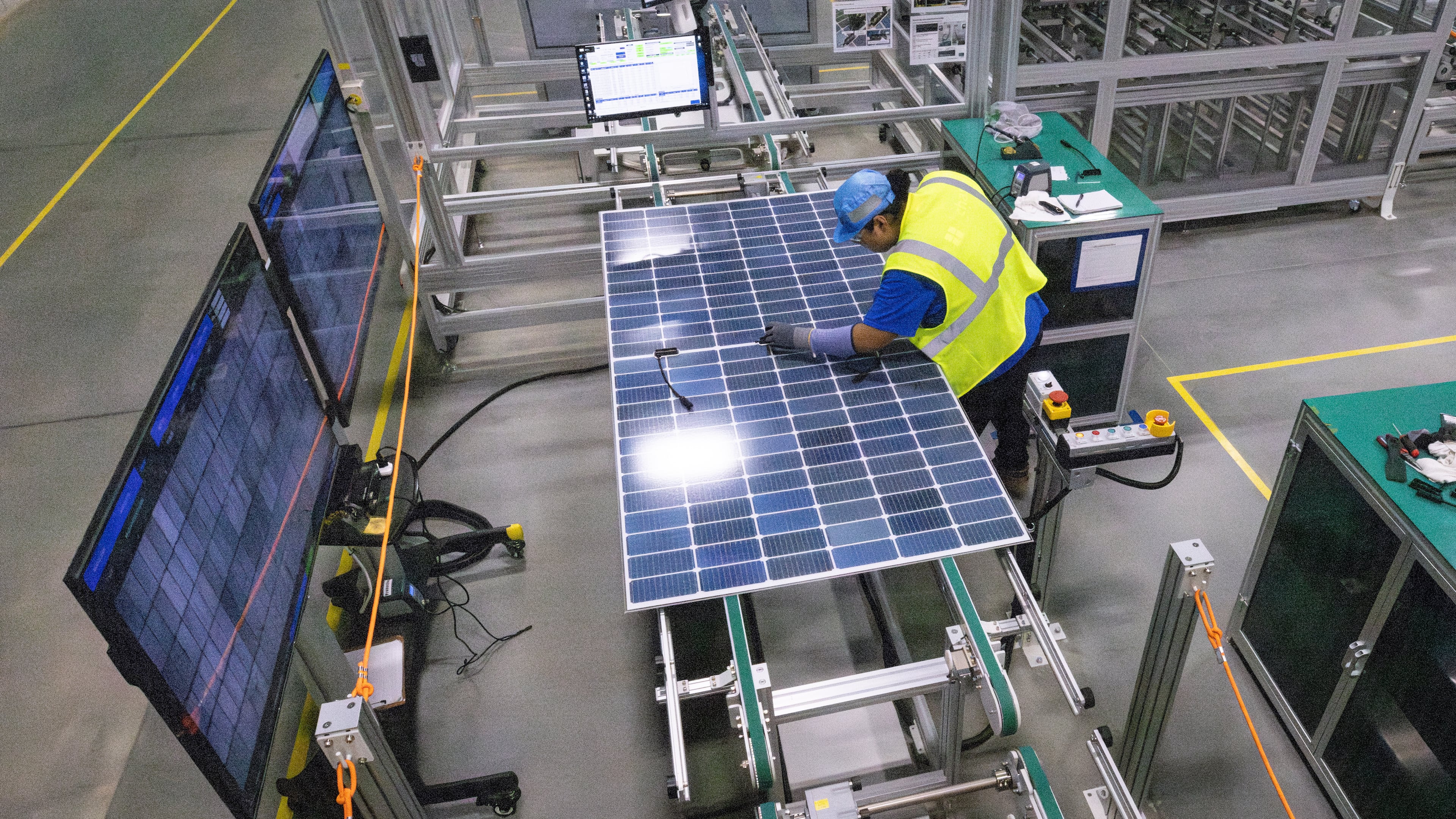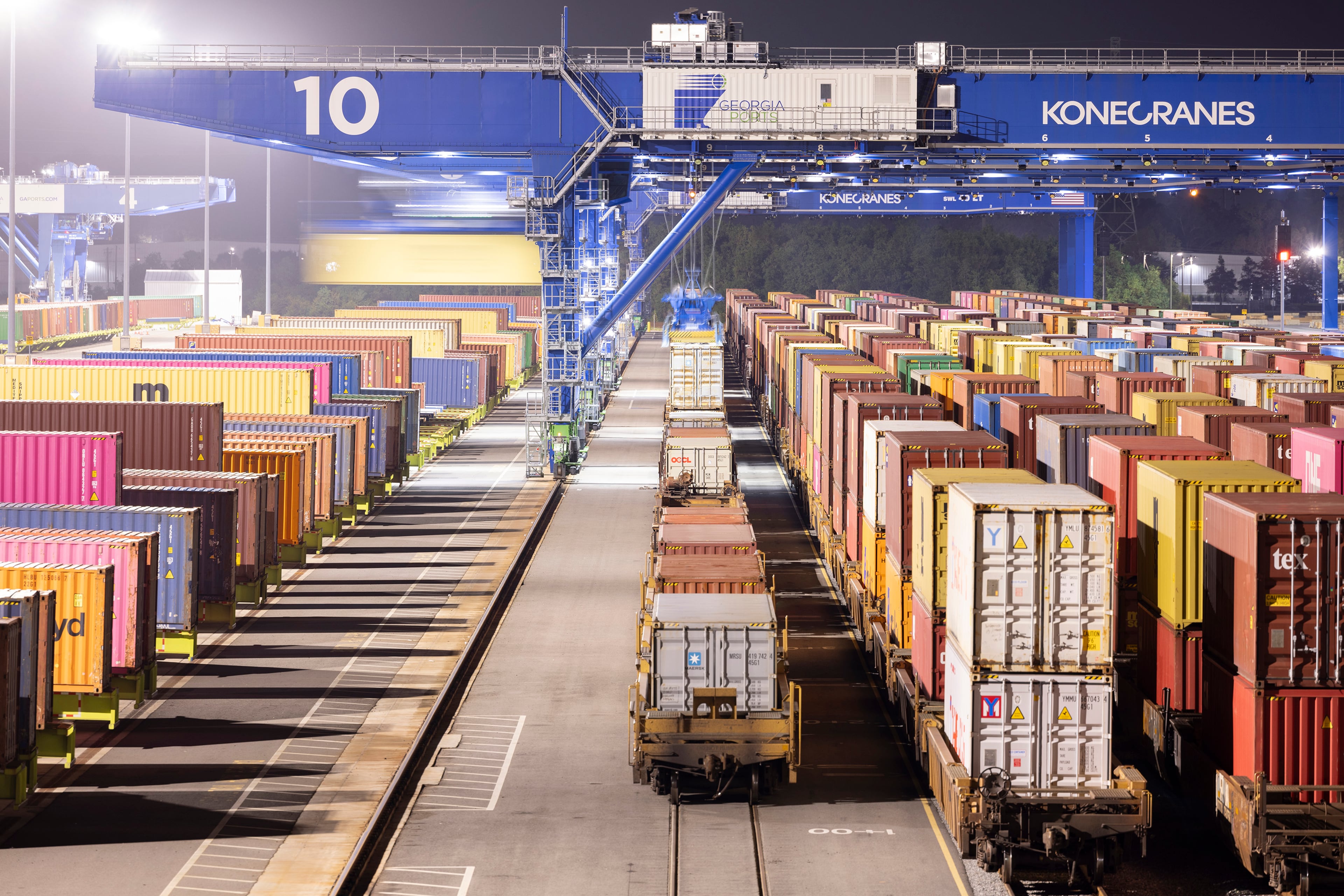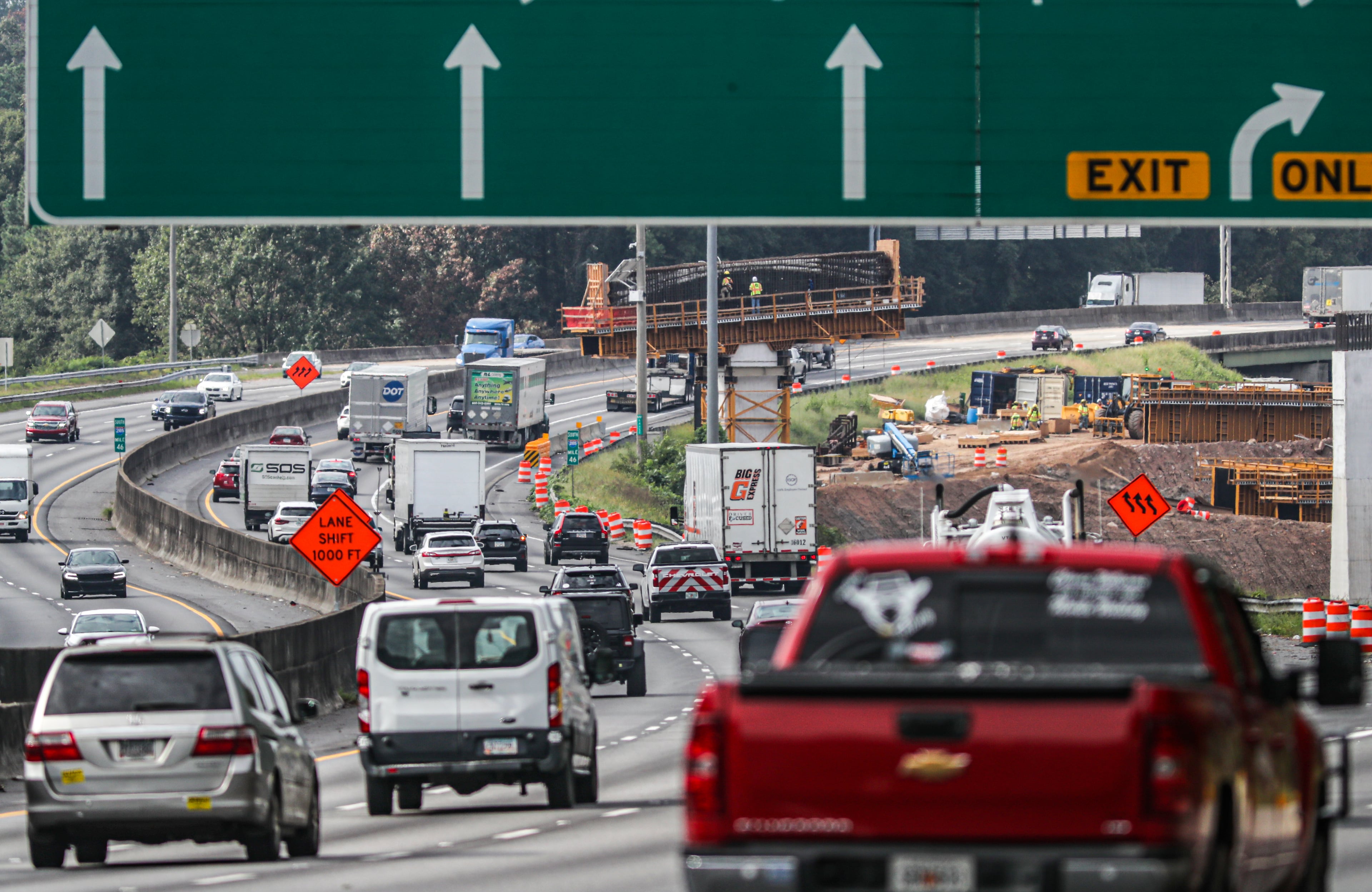Here’s what a second Trump administration could mean for Georgia

The reelection of Donald Trump to a second term could profoundly reshape the nation.
The Republican campaigned on bringing about massive change and, if he gets his way, his agenda would transform things such as the economy, immigration and climate policy. On the campaign trail, Trump was often vague about specific policies. Instead, he frequently talked in sound bites, slogans and pledges.
The Atlanta Journal-Constitution has reporters who have deep expertise in these areas. Here they explain what a second Trump administration could mean in Georgia:
Abortion

Georgia’s abortion ban makes the procedure illegal after fetal cardiac activity is detected — typically about six weeks into a pregnancy and before many know they are pregnant. It is unlikely to be changed by Trump’s win.
Although Trump paved the way for states to put in place restrictive new abortion laws by appointing three of the six U.S. Supreme Court justices who overturned Roe v. Wade, he has said he would not sign a federal abortion ban.
Georgia’s law could be impacted instead by the state’s highest court, which is considering an appeal of a Fulton County Superior Court order that held the state’s law that took effect in July 2022 was unconstitutional because it violated a woman’s right to liberty by taking away her ability to decide what to do with her body.
Trump said in August that he would not revive enforcement of the 1873 Comstock Act, which would make it a federal crime to send or receive abortion drugs through the mail. But his running mate, JD Vance, has signaled support for doing so. Additionally, Trump could name abortion opponents to key posts in the federal government.
— Staff writer Maya T. Prabhu
Agriculture

Higher fuel costs and fertilizer prices have eaten into the profits of the state’s farmers. Competition from imports, plus the consolidation of food and fiber production on mega farms, have also priced out smaller growers.
As if that wasn’t bad enough for agriculture, which is Georgia’s largest industry, Hurricane Helene pummeled the state in September, causing at least $6.46 billion in estimated damage. Helene came on the heels of damage from Hurricane Michael in 2018 and Hurricane Idalia last year.
What the Trump administration will do to provide relief is not clear. His campaign website and the GOP’s platform offer only pledges to “protect American workers and farmers from unfair trade.”
Based on Trump’s history and campaign rhetoric, that will likely involve tariffs.
During his first term, Trump imposed steep duties on $300 billion of Chinese imports, including commodities such as soybeans. China is by far the biggest market for U.S. soybeans, and Trump’s tariffs touched off a trade war that cost American growers dearly.
His administration responded with billions in direct payments to ease the pain, but the program deepened the federal deficit.
— Staff writer Drew Kann
Climate/green technology

President Joe Biden’s signature climate and health law, the Inflation Reduction Act, created tax breaks for companies to manufacture their electric vehicles, batteries, solar panels and more in the U.S., and it established lucrative incentives for consumers to buy North American-made products.
Georgia has been one of its biggest beneficiaries.
The solar giant Qcells has said its decision to invest $2.5 billion in expanding its Georgia manufacturing footprint was driven, in part, by the law’s incentives. Hyundai Motor Group will also reap the benefits of the law as it builds EVs at its hulking new plant near Savannah.
Those two projects alone have promised to create upward of 10,000 jobs in Georgia. The constellation of suppliers they’ve brought to the state are expected to generate thousands of other positions.
Trump has made clear he’s no fan of the law, calling Democrats’ climate spending a scam and signaling he may seek to repeal it. But some of his fellow Republicans, such as U.S. Rep. Buddy Carter, whose district includes the Hyundai plant, have warned that rolling back the incentives could imperil jobs destined for states such as Georgia.
Adam Orford, an assistant professor of environmental law at the University of Georgia, said some of the law’s grant funding could be vulnerable, but that Trump and Congress “may face an uphill battle” to remove the tax breaks.
More broadly, Trump has called human-made climate change a “hoax.”
That means stricter emissions standards for cars and power plants finalized under Biden are likely to be curbed, and though America is already producing more oil than any country in history, Trump wants that to expand.
— Staff writer Drew Kann
Economy
Trump will inherit a growing economy with low unemployment and cooling inflation, similar to when he took office in 2017 for his first term.
In that first term, Trump signed a broad tax cut, tried to stifle immigration and started a trade tussle with China. This time his economic goals are much more aggressive, particularly regarding tariffs.
The results this time are uncertain, though economists say they could mean somewhat faster economic growth but also higher inflation and unemployment.
The growth could come from extending the tax cuts passed in his first administration and possibly adding new cuts.
Lower taxes can mean more disposable income for consumers, which translates into more spending and faster economic growth.
Harder to predict are the results from some other big promises, especially his vow to carry out “massive deportations” of immigrants without legal status, a plan he could initiate with an executive order.
If he tries to round up and deport more than 10 million people, he will be pulling most of them out of a workforce where they do low-wage jobs such as housekeeper, laborer or farmworker.
Experts say that could mean much higher costs for employers, who would likely pass them on to consumers.
Trump also promised much more aggressive tariffs this time, especially against Chinese imports. And tariffs are also something that can be imposed without congressional approval.
While the idea is to protect and nurture American manufacturing, economists warn that at least the short-term effect will be inflationary, as importers pass along the tariffs to consumers and companies
— Staff writer Michael E. Kanell
Health
During his first term, Trump promised to repeal the Affordable Care Act, enacted under President Barack Obama, but he was unsuccessful even though Republicans controlled both chambers of Congress.
More recently, he has also said he wants to improve the law. In the September presidential debate he said he had the “concepts of a plan” to do so but provided no specifics.
In Georgia, about 1.3 million people purchase their health insurance coverage through the ACA.
The Biden administration feuded with Georgia Gov. Brian Kemp over Medicaid expansion in the state. Georgia eventually expanded Medicaid, which provides taxpayer-funded health care to the poor and disabled. But it is the only program in the nation with a work or activity requirement. The first Trump administration signed off on Kemp’s plan, so it’s not expected to face opposition.
Trump has not detailed plans for the U.S. Centers for Disease Control and Prevention, which employs about 15,000 people at its headquarters in Atlanta. But he has discussed in broad terms the need to cut the federal workforce.
Trump has also suggested he would rely on Robert F. Kennedy Jr. for guidance on health issues. Kennedy is a skeptic of vaccines and has said he will press to remove fluoride from drinking water. In both cases he has cited health concerns that medical experts say do not exist.
— Staff writers Ariel Hart and Helena Oliviero
Housing

Trump will face a mounting crisis worsened by a yearslong housing shortage and a post-pandemic economy that’s left Georgians facing inflated housing prices, high interest rates and rents.
The National Low Income Housing Coalition estimates that in 2022 more than half of Georgia’s low-income earners were spending more than 30% of their income on housing costs, and 8% were spending more than 50% of their income.
A recent study by the group Up For Growth found that in 2022 Georgia had a shortage of 124,000 available homes, with 100,000 of that shortfall concentrated in metro Atlanta.
Trump has said he will free up federal land for housing and eliminate regulations driving up costs. More controversially, the president-elect has blamed a lack of housing on immigrants in the country illegally. (Redfin’s chief economist, Daryl Fairweather, doesn’t believe population control is good housing policy, and he says the focus should be on meeting demand for housing, not suppressing it).
In October, Republican National Committee spokesperson Taylor Rogers told the AJC that Trump would bring down inflation, cut the cost to build homes in half and push mortgage rates down.
Housing advocates say the crisis is worsening homelessness. In Atlanta, there are about 2,870 people experiencing homelessness, according to Partners for HOME, with more in transitional housing and emergency shelters.
Trump has previously called for bans on urban camping and tied homelessness to crime. Dozens of local governments in Georgia have passed laws that ban sleeping outdoors.
— Staff writer Matt Reynolds
Immigration
Among the biggest pillars of Trump’s 2024 platform was a restrictive immigration agenda.
He has pledged to launch the largest deportation program in American history, which could remove more than 10 million immigrants who entered the country without authorization, many of whom have been living in the country for decades.
Increased deportations could have a profound effect throughout Georgia, particularly in communities with outsize immigrant and Latino representation. That list includes places such as Dalton, which is majority Hispanic, and Gainesville, a city that by some estimates leads all U.S. metro areas for the highest proportion of residents lacking legal status.
Widespread deportations would hobble a number of industries that are key to Georgia’s economy, including agriculture, food processing, hospitality, construction and manufacturing. All of them are heavily reliant on immigrant labor.

In addition, Trump is also expected to end various humanitarian programs enacted during the Biden administration to protect some recent migrants from deportation and make them eligible for work permits. That reversal will likely affect thousands throughout Georgia.
As a regional leader in refugee resettlement, metro Atlanta and its web of local nonprofits that serve refugees — these are people who come to the U.S. legally because they fear persecution back home — will likely have to contend with cuts to the refugee program.
In his first term, Trump cut deeply into the country’s annual refugee admissions cap, bringing it to a historic low of 18,000. Biden brought it back up to 125,000. Now, Trump appears poised to suspend the program altogether.
Additional policies to look out for: an attempt to end birthright citizenship and a militarization of the southern border.
— Staff writer Lautaro Grinspan
Ports

Georgia is home to the East Coast’s second-busiest cargo container port in Savannah and the second-busiest auto port in Brunswick.
Over the past two decades, federal infrastructure investment has flowed to both regardless of the political party in power.
Improvements range from the $1 billion-plus Savannah River deepening — a project that spanned four administrations — to last week’s $49 million grant to install systems to connect docked vessels to the electric grid.
Under Trump, the biggest change could involve trade policy. The Republican has vowed to encourage manufacturing growth in the United States by imposing tariffs of 10% to 20% on all imports and 60% to 100% tariffs on goods from China. About 38% of Georgia’s port imports come from China.
Retaliatory tariffs could also have an impact. Georgia is China’s chief trading partner for agricultural exports, with products such as peanuts, animal feed and frozen meats leaving Savannah bound for Chinese ports.
Yet the Georgia ports weathered a trade war waged by Trump during his previous term. In fact, the ports’ business grew by 41% between 2017 and 2020, from 3.9 million container equivalency units to 5.5 million.
Then there are labor union negotiations. Longshoremen at East Coast and Gulf Coast ports went on strike for four days in October before reaching a tentative deal with the shippers and private port operating firms of the U.S. Maritime Alliance.
The Biden administration worked behind the scenes to help the two sides reach an agreement. The deadline to finalize the new contract is Jan. 15, 2025, just five days before Trump’s inauguration.
While Trump courted union members during his campaign, he has also vowed to overturn Biden policies making it easier for workers to join unions. It’s unclear what he would do if the contract signing is delayed.
— Staff writer Adam Van Brimmer
Transportation

Federal funding for transportation infrastructure boomed under Biden, who secured a $1.2 trillion five-year infrastructure deal in 2021. More than $10 billion of that money has gone to projects in Georgia, with over half the money designated for roads and bridges. Roughly $700 million was set aside for public transportation and $84 million for electric vehicle chargers.
The bipartisan infrastructure legislation provides funding through 2026, allowing Trump to have a say in how some of that money is spent as it winds down.
The president-elect’s platform doesn’t specifically mention transportation except for pledging to end Biden-era electric vehicle tax credits and incentives.
During his first term, Trump proposed a $1 trillion infrastructure plan focused on roads and bridges. He was unable to secure a funding deal with Congress, however, and federal transportation funding remained stagnant.
One of the most significant changes in the new administration could involve what types of projects are funded.
Under the Biden administration, biking and pedestrian projects received the biggest share of federal transportation grants. During Trump’s first term, road expansion projects dominated, according to a report from the Washington-based Urban Institute.
Road projects are likely to be prioritized again in his second term, which would put transit projects in metro Atlanta at a disadvantage.
— Staff writer Sara Gregory


